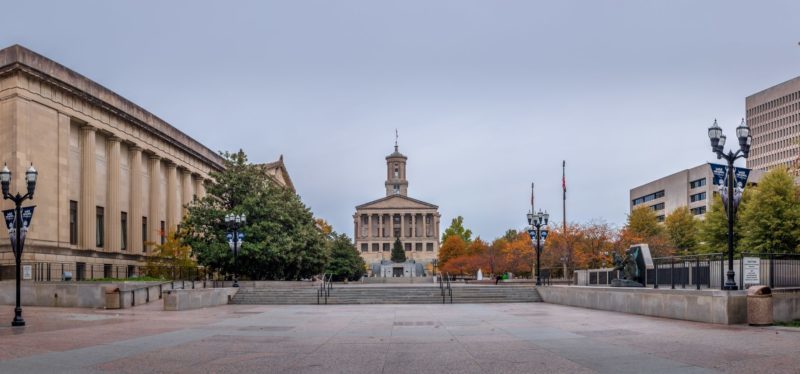As part of our commitment to focus on issues-based advocacy, the Libertarian Party of Tennessee will be focused on five key legislative areas in the 2020 state legislative cycle.
We’ll be asking our officers and activists to engage the general public, their local officials, and their state representatives, to advocate for these key legislative areas throughout 2020.
Here’s the breakdown:
1. Ranked Choice
Ranked Choice Voting (RCV) changes nothing about the election process itself. It does not affect how primaries are conducted, party requirements, ballot qualification, or even the electoral college.
In application, RCV increases each individual’s power and influence on the election process, a goal that should be pursued by any lawmaker who believes that we should have a government of, by, and for the people.
Simply put, RCV is a system that allows voters to rank their choices in order of preference and, through an instant runoff process, candidates are required to receive a majority (NOT a plurality) in order to be elected to office.
RCV reforms remove the “fear vote” calculus by allowing voters to choose their desired candidates without the fear their vote will result in the election of a despised candidate.
Due to the instant runoff nature of the system, RCV is also a fiscally conservative choice. A 2019 runoff in Nashville cost taxpayers $675,000. Adopting RCV and instant runoff voting would save taxpayers millions of dollars in the future by eliminating the need for these special elections.
Data also shows that the current implementations of RCV discourage negative campaigning and more directly incentivizes politicians (who now require 51% of the vote to get elected) to talk about their platform instead of using their resources slinging mud. This gets us less extreme policy, less toxic campaigns, and candidates who mean to work for all the people instead of one specific group.
Summary
Going into 2020, we are focused on encouraging local officials to make RCV a priority in their communities because it greatly empowers the voters they represent.
The LPTN is also working with Ranked Choice Tennessee on a piece of legislation that will clarify state law to make it easier for local municipalities to pass ranked-choice voting initiatives without coming in conflict with state law.
We’ll be providing opportunities for activists to advocate for this legislation once the bill is finalized.
Resources
2. Civil Asset Forfeiture Reform
Civil Asset Forfeiture (CAF) is a legal tool that allows law enforcement to seize property from a person who is simply suspected of a crime, with no requirement to charge a person with a crime at all. This is in contrast to Criminal Asset Forfeiture: when a convicted criminal’s profits from their illicit activities are confiscated after conviction which is a whole separate issue.
In 2017 alone, Tennessee law enforcement seized over $17.5M in cash as well as 2470 vehicles, 369 firearms, 394 computers, and 486 items noted as jewelry or collectibles.
CAF is also bolstered through federal “Equitable Sharing,” which is a program that allows Tennessee laws to be disregarded by law enforcement agencies statewide by allowing them to run their seized cash and assets through the feds.
Stories like the one from Sevierville with the woman who’s inheritance of $11,000 was seized by the police because they thought over-the-counter antacid medication in her vehicle were illicit drugs highlight the critical need for immediate reform. Local prosecutors and police dropped the criminal drug charges, but the woman had to fight for years for the return of her money through the state’s administrative law process, and she was one of the lucky ones who actually received her assets back.
The practice of CAF violates the principle of “innocent until proven guilty.”
Summary
Rep Daniel’s legislation HB340 – or a variation of the bill that addresses the “Federal Equitable Sharing Loophole” – will be back up for debate in the 2020 session. Alongside Campaign to End Civil Asset Forfeiture, the LPTN will be working to support Rep Daniel’s initiatives in the statehouse to achieve real reform in the issue of CAF.
Resources
The Human Impact of Civil Asset Forfeiture in Tennessee
3. “Fully Informed Jury” Legislation
Jury Nullification has existed since the founding of our nation. The ability of a jury to acquit an individual based on a misapplication of the law, or to simply reject a law outright, was seen by the founders as an important source of feedback from the people as to what laws they deem tolerable and acceptable.
It is necessary for a society, founded on the premise of self-government, for people to be able to provide a check against poor legislation implemented by their legislators.
In our current system, while considering a case, a judge gives instructions to the jury about how to apply the law, without informing the jury of their right to declare a law as misapplied or not applicable at all. The legislation we support would simply require a judge to inform the jury of their right to use their own minds to determine whether or not a defendant is a threat to individuals or society at large by nullifying a law in its entirety.
Summary
A variation of Rep Martin Daniel’s “Fully Informed Jury” legislation (SB369/HB368) will eventually make its way back into the legislature. The LPTN will be working on public awareness, legislator awareness, and activism to revive this bill. This bill required judges to inform juries of their right to nullify state law. When this bill makes its way back to the legislature, we want the public to be ready to get behind it.
Resources
4. Cannabis Decriminalization
History proves prohibition does not work.
In 1920, there was a constitutional amendment passed to ban alcohol. The immediate result was a spike in violent crime. 13 years of bloodshed, combined with extended public opposition, eventually led to the repeal of that amendment.
Fast forward to 1971 when Richard Nixon declared his “war on drugs” as a means to attack two groups that opposed him, “blacks and hippies.”
Since then, we have spent over a trillion taxpayer dollars, torn apart families, subjected many children to one-parent households, and stigmatized entire demographics of our population. Meanwhile, the demand for illicit drugs in the black market has remained unchanged, while the US addiction rate has remained static. During this time, uncountable violence has been created within the black market – bringing up memories of the old mafia of the first prohibition.

Put simply, the LPTN seeks to address the root of the problem: the historically proven failed policy of prohibition.
Under current state law, the possession of up to half an ounce of THC cannabis is classified as a criminal misdemeanor, punishable by up to one year in jail and a maximum fine of $500. Removing the criminal charge that comes with the possession of marijuana is a first step is reforming Tennessee laws to abolish prohibition entirely.
From LP.org:
Libertarians believe that the War on Drugs is ineffective, unfair, and immoral. We advocate ending it.
The War on Drugs is ineffective at limiting access to dangerous drugs and, instead, empowers dangerous gangs that make incredible fortunes on the black market for these illegal drugs.
The War on Drugs has imprisoned millions of non-violent people. This is unfair to these people and also uses up resources that would be better spent prosecuting and imprisoning people who are violent.
The War on Drugs is largely responsible for the militarization of police forces in America. It has pitted police against citizens and this is unfair to both. Police need to be able to focus on protecting the American public from violent offenders and fraud.
Lastly, Libertarians believe that it is immoral for the government to dictate which substances a person is permitted to consume, whether it is alcohol, tobacco, herbal remedies, saturated fat, marijuana, etc. These decisions belong to individual people, not the government.
Summary
The LPTN will be asking activists to participate in “on the hill” lobbying at the State House to support a piece of legislation that removes criminal penalties for small amounts of marijuana. Gloria Johnson’s bill (HB235/SB256) removes criminal penalties for the possession of up to one ounce of THC cannabis and will be up for debate this year – but it remains to be seen if a more robust version of her bill will be introduced by a different sponsor. We will opt to support the legislation with the largest reduction of criminal penalties.
5. Ballot Access Reform
The Tennessee state constitution mandates that elections be “free and equal.” Currently, state law allows Democrat, Republican, and Independent candidates to get on the ballot by collecting 25 signatures. However, if you want to run with a C by your name as a member of the Constitution Party, G for Green Party, L for Libertarian Party, or any other affiliation than D, R, or I, you must collect 56,082 signatures (2.5% of the votes cast in the last gubernatorial race). Alternative parties must then run a candidate for Governor or Senate within a small window, achieve 5% of the vote, or their ballot access is immediately revoked.
What is the reason that a third party candidate can run as an independent with 25 signatures, but in order for them to have their party label they need 56,082 signatures? The answer is simple: branding.
Tennessee’s current ballot access laws are designed to prevent the use of party-affiliated branding for all groups that are not Democrat or Republican. It’s a farce that seeks to force people to choose between the two accepted brands, and if you don’t, your voice is irrelevant.
This is the purest example of protection of party power through policy and it must be stopped. There are more than 8 million people in Tennessee and it’s insulting to think they all fall into one of two groups.
Summary
The LPTN will be bringing a slate of options to legislators and the public for ballot access reform this year to build further consensus on a legislative solution. LPTN activists will be working to understand which option is the most palatable to the legislature and the general public with the intent of drafting legislation for debate in the 2021 legislative cycle.
The proposed reform options include:
- Complete abolishment of the primary requirement
- Including 3rd parties in the 25 signature requirement
- Reduce signature collection thresholds to a flat rate – targeting 10k statewide, a number that represents the median nationally.
- This would also adjust county signature totals as a percentage of this flat rate total based on the county population
- Removal of all signature requirements for party affiliate statewide
Litigation is not off the table – we intend to finalize our litigative strategy within the next 30 days to operate in tandem with our legislative strategy.
Get Involved!
If you’re interested in getting involved with our legislative campaign, please complete the form below and our legislative committee will get in touch with you:





